|
|
|
Sort Order |
|
|
|
Items / Page
|
|
|
|
|
|
|
| Srl | Item |
| 1 |
ID:
192202
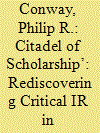

|
|
|
|
|
| Summary/Abstract |
‘Critical’ international relations (IR) is usually understood to have originated in the early 1980s. However, a close reading of Vithal Rajan’s ‘An Epitaph for Detached Scholarship’, published in the inaugural issue of Millennium in 1971, tells another story. Rajan’s article was not a work of critical theory per se, but it was in tune with demands, at this time, for establishing a ‘critical university’. Promising to open up university education to all, dispensing with traditional curricula and authoritarian modes of teaching, the critical university, like Rajan’s article, has long since been forgotten. Nevertheless, this moment set the scene for the professionalised establishment of ‘critical’ academia in the decades to come. Rediscovering Rajan’s ‘Epitaph’ thus offers to reconnect critical IR with an earlier, and perhaps more generative, moment of inception. Indeed, even today, Rajan’s creative, provocative, playful text stands out as a rewardingly undisciplined contribution to the discipline.
|
|
|
|
|
|
|
|
|
|
|
|
|
|
|
|
| 2 |
ID:
110766
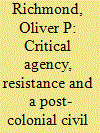

|
|
|
|
|
| Publication |
2011.
|
| Summary/Abstract |
IR's dominant theoretical and methodological approaches are, to varying degrees, compliance oriented. IR needs a theory of resistance if it is to survive its current methodological and ethical crisis. Resistance, read from a broadly Foucaultian perspective, is a process in which hidden, small-scale and marginal agencies have an impact on power, on norms, civil society, the state and the 'international'. This may be in the form of individual or grass-roots critical agency not coordinated or mobilized on a large scale but still globally connected. Such agency is often discursive and aimed at peaceful change and transformation. Through such critical agency a post-colonial civil society has emerged, which is transversal, transnational, fragmented, but may be constitutive of new, hybrid and post-liberal forms of peace.
|
|
|
|
|
|
|
|
|
|
|
|
|
|
|
|
| 3 |
ID:
170369
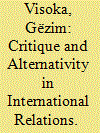

|
|
|
|
|
| Summary/Abstract |
This article critically interrogates the episteme of alternativity in international relations (IR) to rethink the purpose of critical knowledge in global politics. It questions what critical knowledge is for and whose purpose it serves. While alternativity is the very condition that has given rise to critical approaches, there is a deep-rooted division among critical scholars regarding the relationship between criticality and alternativity. This article argues that alternativity provides an opportunity for critical scholars to remain relevant without being affiliated with positivist logics of inquiry. In examining the potential of alternativity, the article explores three modes of alternativity in peace and conflict studies: critique-without-alternative, critique-as-alternative, and critique-with-alternative. It probes the merits and limits of the episteme of alternativity in generating new possibilities for advancing emancipatory interests and saving critical theory from losing its original transformative impetus. In the final part, the article explores future directions for rejuvenating the purpose of critique by exploring the nexus between criticality and alternativity on postparadigmatic and practical grounds.
|
|
|
|
|
|
|
|
|
|
|
|
|
|
|
|
| 4 |
ID:
083544
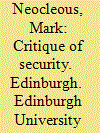

|
|
|
|
|
| Publication |
Edinburgh, Edinburgh University Press, 2008.
|
| Description |
vi, 247 p.
|
| Standard Number |
9780748633296
|
|
|
|
|
|
|
|
|
|
|
|
Copies: C:1/I:0,R:0,Q:0
Circulation
| Accession# | Call# | Current Location | Status | Policy | Location |
| 053953 | 333.79/NEO 053953 | Main | On Shelf | General | |
|
|
|
|
| 5 |
ID:
184133
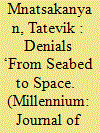

|
|
|
|
|
| Summary/Abstract |
Despite critiques of denials broadly underlying Critical International Relations deconstructions of state, security and subjectivity, there is little explicit exploration of the ontological status of denial, and how denials operate in the politics of (in)security. Animated by the question, why and how web of actors and interests traversing the public and private spheres involved in the provision of security endure despite long-running critique, this article problematises = denials. An explicit theorisation of denial needs to be put centre stage in the study of security. Drawing on Dillon’s theorisation of the unstable duality of (in)security and synthesising it with a Deleuze and Guattarian assemblage approach, it theorises denial in two forms – denial of complicity and denial of the impossibility of security – as ontologically necessary for the politics of (in)security; then proposes that we scrutinise and expose assemblages of (in)security. These assemblages form, endure and expand, by thriving on denials of the impossibility of security and its attendant complicities; forming symbioses of denial traversing the public-private realms. Assemblages of (in)security adapt, expand, and propagate new technologies of (in)security, often ironically by responding to demands from critique. Without an assemblage-based thinking, we are methodologically ill-equipped to trace, expose and critique the politics of (in)security, without unwittingly partaking in denials sustaining it.
|
|
|
|
|
|
|
|
|
|
|
|
|
|
|
|
| 6 |
ID:
179369
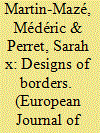

|
|
|
|
|
| Summary/Abstract |
Over the past 15 years, the European Commission has poured millions of euros into Research and Development in border security. This article looks at the devices that are funded under this scheme. To this end, it applies Multiple Correspondence Analysis to a database of 41 projects funded under 7th Framework Programme. This method of data visualisation unearths the deep patterns of opposition that run across the sociotechnical universe where European borders are designed and created. We identify three rationalities of power at play: territorial surveillance aimed at detecting rare events in remote areas, policing of dense human flows by sorting out the benign from the dangerous, and finally global dataveillance of cargo on the move. Instead of trends towards either the hardening of borders or their virtualisation, we, therefore, find multiple rationalities of power simultaneously redefining the modalities of control at EU borders. A second finding shows where precisely critical actors are located in this sociotechnical universe and indicates that the structure of European R&D in border security keeps irregularised migrants off their radars. This finding calls for more caution as to the possibility to effectively put critique to work within the context of EU R&D.
|
|
|
|
|
|
|
|
|
|
|
|
|
|
|
|
| 7 |
ID:
164283


|
|
|
|
|
| Summary/Abstract |
What does it mean to study security from a critical perspective? This question continues to haunt critical security studies. Conversations about normative stances, political engagement, and the role of critique are mainstays of the discipline. This article argues that these conversations tend to revolve around a too disembodied image of research, where the everyday practice of researchers is sidelined. But researchers do do research: they work materially, socially, and cognitively. They mediate between various feedback loops or fields of critique. In doing so, they actively build and exercise critique. Recognizing that fact, this article resists growing suggestions to abandon critique by, first, returning to the practice of critique through the notion of companionship. This permits us to reinvigorate our attention to the objects, persons, and phenomena through which critique gains inspiration and purpose, and that literally accompany our relationship to critique. Second, we explore what happens when our companions disagree, when critique faces controversies and (a) symmetries. Here, we support research designs of tracing credibility and establishing symmetries in order to move away from critique as denouncing positions we disagree with. Third, we discuss the relation between companionship, critique, reflexivity, and style. Here, the rhetorical practices of critical inquiry are laid out, and possibilities for its articulation in different and less silencing voices are proposed.
|
|
|
|
|
|
|
|
|
|
|
|
|
|
|
|
| 8 |
ID:
165327
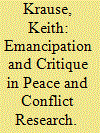

|
|
|
|
|
| Summary/Abstract |
This contribution examines how the critical potential of research on peace in International Relations has been simultaneously marginalized and transformed. It briefly traces the evolution of peace research, as well as choices, contestation, and breaks in the construction (and “disciplining”) of peace and conflict research. It then focuses on two epistemological and normative choices that occlude the emancipatory potential of peace research and marginalize certain approaches to the study of the causes of war and conditions of peace. In a more positive vein, it illustrates, with examples from recent research, where potentially emancipatory or transformative scholarship on building peace has migrated.
|
|
|
|
|
|
|
|
|
|
|
|
|
|
|
|
| 9 |
ID:
141301
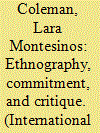

|
|
|
|
|
| Summary/Abstract |
This article addresses the vexed question of relations between critique and political struggle. As emphasis upon the “impact” of research increases, possibilities of integrating research into practices of resistance have been highlighted. Such approaches lend themselves to ethnographic methods, with scholars engaged in these ways offering nuanced reflections on possibilities of “bridging gaps” between research and solidarity. Here, however, I draw on over a decade of “activist” ethnography to highlight risks of conceptual enclosure associated with this move. The politics of struggle are quickly erased through available categories and problematics, which are readily absorbed into existing constellations of power. By contrast, the gaps between solidarity and writing provide spaces for emergence of a critical attitude—along lines sketched by Foucault. Nevertheless, to “apply” Foucault to this sort of ethnography carries a risk of betrayal. Foucault's critical ethos can be neither starting point nor end of engagement with actually existing struggles. Inspired by the philosophical tradition in which Foucault's work was rooted, I advocate a practice that gives weight to ontologies emerging from struggle as conjectures perpetually in question. This implies not closing gaps but a persistent back-and-forth between critique and commitment—risking ourselves as subjects at both ends.
|
|
|
|
|
|
|
|
|
|
|
|
|
|
|
|
| 10 |
ID:
164287
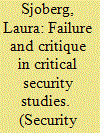

|
|
|
|
|
| Summary/Abstract |
Debates imitates scholarship, which imitates debate. Using perspectives from both my policy debate career and my research career, this article argues that the enterprise of critique, whether in critical security studies or elsewhere, is always and already failing and failed. It proceeds in four sections. The first section sets up my entry into the problems of/with critique. The second section analyzes the types of dissonances inherent in the production of critical security studies scholarship. The third section theorizes those dissonances as failures – arguing that failure itself is a part of in and of critical security studies. The conclusion discusses where to go from, during, and in a world of failed critique in critical security studies.
|
|
|
|
|
|
|
|
|
|
|
|
|
|
|
|
| 11 |
ID:
145977
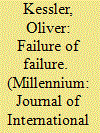

|
|
|
|
|
| Summary/Abstract |
This article explores the relevance of failure for constructivism. Starting from the constructivist focus on ‘language in use’, it conceptualises ‘failure’ as a concept rather than as an observed end or result. Instead of explaining or understanding some empirical failure, the primary questions now become how this concept is being used, and what performative consequences can be observed from this use. As such, the article’s first section develops three ‘uses’ or ‘notions’ of failure: failure as a ‘wrong representation’ of an objectively given reality; failure to produce an inter-subjective understanding that allows actors ‘to go on’; and failure as ‘mode of organisation’ that highlights its discursive grammar, or rules of formation, and the importance of social imaginaries grounding this process. The article’s second section then reconstructs the performance of ‘failure’ in the context of global finance and shows how the market, as a social imaginary, determines questions of authority and expertise. In doing so, this article points to the need for a socio-political economic analysis of economics, and the performance of its concepts, models, and assumptions.
|
|
|
|
|
|
|
|
|
|
|
|
|
|
|
|
| 12 |
ID:
164288
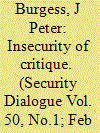

|
|
|
|
|
| Summary/Abstract |
‘Security’ is a uniquely rich object for critique. It rests on a long and noble conceptual history in Western thought. And yet the provision of security most often consists of a shoring up, through the discourses of nationality, ethnicity, political economy or even science, of what is assumed to be solid at its core but weakened through the contingencies of politics, society, ideology, and so on. The article argues that the critical force of critique stems from the fact that critique itself is a practice inescapably bound up with insecurity, and thus that the critique of security exercised since around 1997 as ‘critical security studies’ is self-replicating. By introducing concepts from Husserlian phenomenology, it attempts to show that insecurity is not a simple feature of an otherwise secure state of life, ripe for critical analysis that promises to expose its false premises. Rather, insecurity lies at the very foundation of critical thought. Building upon the bare and basic question, ‘What does it mean to mean?’, a phenomenology of security asks the straightforward question: ‘What is the security-ness of security?’ It permits one to ask what remains of security when all else is stripped away, what essential minimum must be retained in order for security to be security.
|
|
|
|
|
|
|
|
|
|
|
|
|
|
|
|
| 13 |
ID:
169062
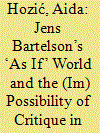

|
|
|
| 14 |
ID:
180011
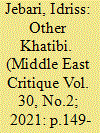

|
|
|
|
|
| Summary/Abstract |
The recent revival of interest in Moroccan thinker Abdelkebir Khatibi (1938–2009) around the English release of his seminal 1983 essay, Maghreb Pluriel represents an opportunity to place this thinker in the inner circle of post-1967 Arab thought. This article argues that most coverage and commemoration of him has been devoted to a glorified side of his trajectory that fits neatly within the framework of ‘postcolonial francophone intellectuals.’ However, this article argues that we must revise the meaning of his seminal book and his call for a ‘plural Maghreb’ to see it also as the demise of his project for a decolonized sociology in Morocco, which was necessary to set his sights toward semiology and his significant literary oeuvre. His example informs us on Arab intellectual strategies after the end of grand ideological narratives, and how to write Arab intellectual and cultural histories without succumbing to the trap of nostalgia.
|
|
|
|
|
|
|
|
|
|
|
|
|
|
|
|
| 15 |
ID:
146656
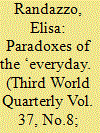

|
|
|
|
|
| Summary/Abstract |
With the advent of the local turn in the mid-2000s, critical approaches have attempted to rethink peace building from the bottom up, placing local agents at the centre of the debate, declaring the end of top-down governance and affirming the fragmented, complex and plural nature of the social milieu. While local turn approaches have become popular in peace-building theory, this article invites the reader to question and problematise the local turn’s use of the concept of ‘everyday’, in order to explore paradoxes and contradictions that indicate the need to think more deeply about the impact of the local turn’s project of critique.
|
|
|
|
|
|
|
|
|
|
|
|
|
|
|
|
| 16 |
ID:
187034
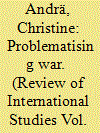

|
|
|
|
|
| Summary/Abstract |
This article redirects extant critiques of the modern problem of war at this problem's underlying logic of deviance. According to this logic, war constitutes a kind of international conduct that contravenes behavioural norms and that can be corrected through diagnostic and didactic means. Thereby, war is rendered into a problem falling within the scope of human agency. However, this agency rests on and reproduces this logic's constitutive blind spots. Therefore, it seems imperative to develop ways of problematising war otherwise. The article provides two starting points for (critical) IR scholarship seeking to undertake such a project. Firstly, it combines two Foucaultian tools, the concept of problematisation and the method of genealogy, to direct critique at the logics underlying our evaluative – analytical, ethical, and political – judgements. Secondly, it uses these tools to trace the contingent emergence of the logic of deviance in a crucial example within the wider genealogy of the problem of war: the Carnegie Endowment's commission of inquiry into the Balkan Wars of 1912 and 1913. Based on original archival research, I highlight different elements of this inquiry's problematisation of war – its frames, assumptions, ways of knowing, and subjects of knowledge – to make them available for reconstruction.
|
|
|
|
|
|
|
|
|
|
|
|
|
|
|
|
| 17 |
ID:
164286
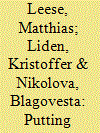

|
|
|
|
|
| Summary/Abstract |
In this article, we examine the possibility of exercising critique through the mandatory ethical coverage that EU security research projects must be subjected to. Applied ethics, so we argue, speaks to several core issues in the critical security studies agenda, such as turning abstract considerations of critique into forms of tangible cooperation, engaging exoteric communities, and placing normative questions about security within concrete contexts of its imagination and production. Accordingly, it can be seen as a concrete way of putting critique to work. At the same time, however, applied ethics does face considerable challenges that result from its location in the middle of numerous cross-pressures, such as political ambitions, economic interests, technological rationales and the demands of security professionals. These challenges risk turning what was intended to be the critical corrective of applied ethics into a legitimizing function of mere ‘ethics approval’. Drawing on personal experiences as well as debates on critical security studies and ethics, we discuss some of these challenges and discuss the possibility of and conditions for critique within the arena of EU security research.
|
|
|
|
|
|
|
|
|
|
|
|
|
|
|
|
| 18 |
ID:
144065
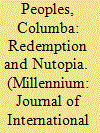

|
|
|
|
|
| Summary/Abstract |
What should the scope of nuclear critique within international studies be? This article addresses that question by making two interrelated arguments. First that political programmes of international nuclear order are crucially underpinned by what is termed here as ‘nutopianism’: a mode of understanding nuclear power that is imbued with a spirit of technological optimism in relation to ‘peaceful’ nuclear power, but simultaneously qualified by an awareness of the destructive uses and catastrophic potentialities of nuclear weapons. Second, that such nutopianism is in turn predicated on the ‘saving power’ of ‘the atom’: the assumption that nuclear power has redeeming features crucial to human progress and economic prosperity, the development of which should be facilitated within the structures of international order. The article makes the case that although critical thought within international studies focuses on nuclear weapons within international order, it has tended to remain largely silent on the issue of ‘civil’ nuclear power beyond nuclear weapons and the complex imbrication between the two. On that basis the article considers whether a more holistic and expansive form of nuclear critique is both possible and necessary.
|
|
|
|
|
|
|
|
|
|
|
|
|
|
|
|
| 19 |
ID:
193302
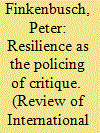

|
|
|
|
|
| Summary/Abstract |
This article offers a critical review of the main conceptual readings of resilience as a prominent policy paradigm in international development, security, and disaster management. Focusing on neoliberal, biopolitical, cybernetic, and postliberal understandings, it probes the possibilities for engaging in a socially transformative critique of resilience. In particular, the article asks how the resilience discourse polices critique in a way that includes certain forms of knowledge, such as indigenous, local, and everyday knowledge, while excluding abstract theorising. What is considered authoritative knowledge in the resilience discourse? And what are the possibilities for opposing resilience if it ‘metabolizes critique into its internal dynamic’, as Jeremy Walker and Melinda Cooper famously argued? How does critique turn from a tool to undermine dominant knowledge-power regimes into a motor of governance? The article demonstrates that the more seriously we engage with the underlying ontology of resilience, the more difficult it becomes to formulate a critique that is not incorporated into governance. As a possible way forward, the article discusses Luc Boltanski's pragmatist sociology of critique.
|
|
|
|
|
|
|
|
|
|
|
|
|
|
|
|
| 20 |
ID:
171160
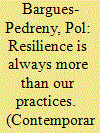

|
|
|
|
|
| Summary/Abstract |
This article examines the response to the crisis of liberal statebuilding in conflict-affected societies since the end of the 2000s. It shows how both resilience policy approaches and academic critical understandings are dissatisfied with the implementation of policies and programs, which seem to fail time and again. That is, there is a widespread perception that resilience is “always more” than what current approaches are providing. In consequence, it is assumed that international interventions require even more locally-sensitive initiatives that are in tune with local needs; new and better technologies, for instance, digital maps to assist practitioners in obtaining sheer volumes of information and accurate representations of space; and programs that are open-ended and flexible. The article cautions that by assuming that satisfactory outcomes are yet to come (i.e., that resilience, or a desired outcome such as peace and security, is still lacking), policy and critical approaches are reproducing and legitimizing failure, furthering neoliberal governance and cementing a profound skepticism.
|
|
|
|
|
|
|
|
|
|
|
|
|
|
|
|
|
|
|
|
|